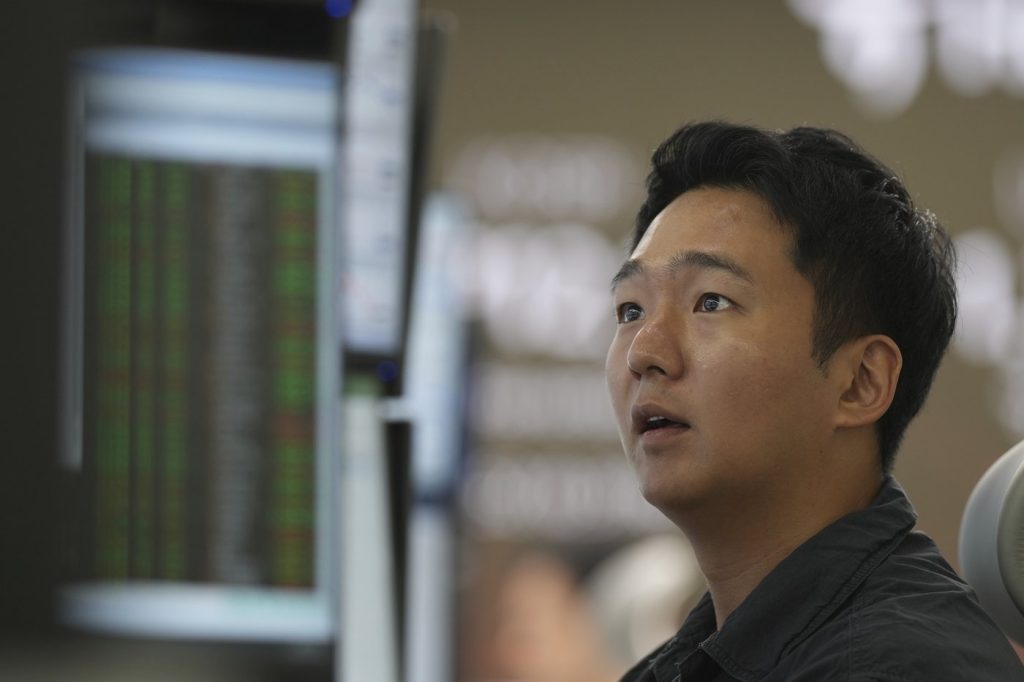TOKYO (AP) – Asian shares experienced a downward trend on Friday as uncertainty escalated following a recent U.S. court ruling that hindered many of President Donald Trump's sweeping tariffs. This has left investors questioning the future implications for the economy and trade.
In Japan, the benchmark Nikkei 225 index fell by 1.4% in morning trading, landing at 37,892.39 points. The country’s core inflation rate, which excludes fresh food, unexpectedly accelerated to 3.6% in May. This increase has led some analysts to speculate that the Bank of Japan might soon raise interest rates in response to inflationary pressures.
Meanwhile, Australia’s S&P/ASX 200 index saw minimal movement, declining less than 0.1% to 8,404.50. South Korea's Kospi experienced a minor drop of 0.6%, finishing at 2,703.64. This decline comes just ahead of a pivotal presidential election scheduled for the following week. In Hong Kong, the Hang Seng index slipped 1.4% to 23,235.94, while the Shanghai Composite saw a smaller decrease of 0.3%, settling at 3,353.07.
On Wall Street, the S&P 500 gained 0.4% on Thursday, although this was after relinquishing more than half of an initial gain. The Dow Jones Industrial Average recorded an increase of 117 points, approximately 0.3%, while the Nasdaq composite also rose by 0.4%. This slight upturn followed a volatile trading session marked by an initial surge of nearly 2% in both the Tokyo and Seoul markets after the U.S. Court of International Trade ruling late Wednesday.
The court articulated that the 1977 International Emergency Economic Powers Act, which Trump cited to justify significant import tax increases, does not authorize tariff imposition. Initially, the ruling was received positively by financial markets, with rising hopes that Trump's limited capacity to escalate tariffs might prevent an economic downturn driven by crippling tariffs.
However, the existing tariffs remain in force as the White House has opted to appeal the court's ruling. The ruling itself pertains only to a portion of Trump’s tariffs, excluding those implemented on foreign steel, aluminum, and automobiles, which were enacted under a different statute. On Thursday, the Court of Appeals for the Federal Circuit allowed the president to temporarily maintain these tariffs while the appeal is in progress.
Ulrike Hoffmann-Burchardi, Chief Investment Officer of Global Equities at UBS Global Wealth Management, noted that Trump retains the authority to impose significant tariffs through other legal avenues. Conversely, on Wall Street, technology stocks led market gains, driven by Nvidia's earnings surpassing analysts’ expectations for profitability and revenue.
Nvidia, now one of the largest and most influential companies in the U.S. market, saw its stock rise by 3.2%, propelling the S&P 500 higher. In contrast, electronics giant Best Buy experienced a sharp decline of 7.3%, despite reporting stronger-than-expected profits. The company also revised its revenue and profit forecasts for the year, citing the assumption that "tariffs remain at the current levels,” according to CFO Matt Bilunas.
Overall, the S&P 500 rose by 23.62 points to reach 5,912.17. The Dow Jones Industrial Average increased by 117.03 points to 42,215.73, while the Nasdaq composite gained 74.93 points, peaking at 19,175.87.
In the bond sector, Treasury yields eased following mixed economic reports. One report indicated that the U.S. economy likely shrank by less than previously estimated in the first quarter, while another highlighted that more U.S. workers applied for unemployment benefits last week than economists had expected. Consequently, the yield on the 10-year Treasury dropped to 4.43% from 4.47% late Wednesday.
In the energy market, benchmark U.S. crude oil fell by 30 cents to $60.64 per barrel, while Brent crude, the international benchmark, decreased by 31 cents to $63.84 per barrel. In currency trading, the U.S. dollar weakened against the Japanese yen, trading at 143.92 yen compared to 144.12 yen previously. The euro also saw a decline, priced at $1.1355 from $1.1367.











